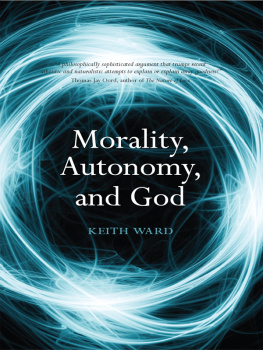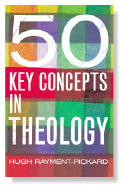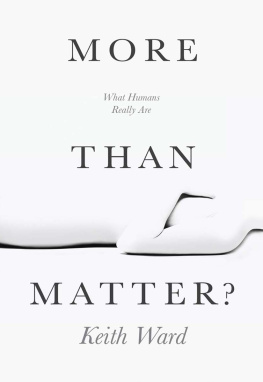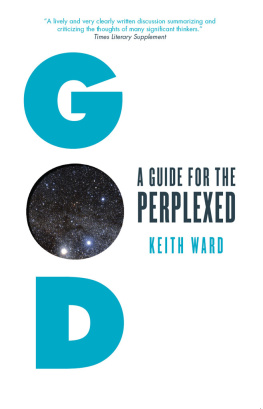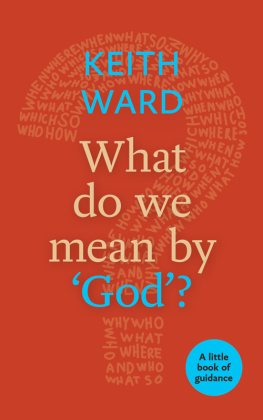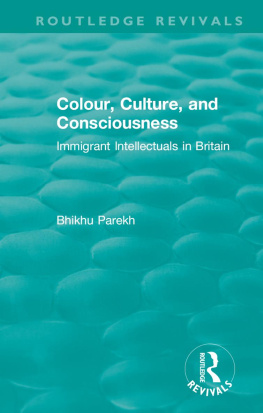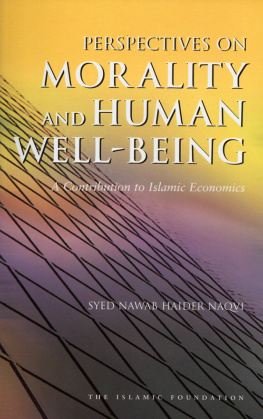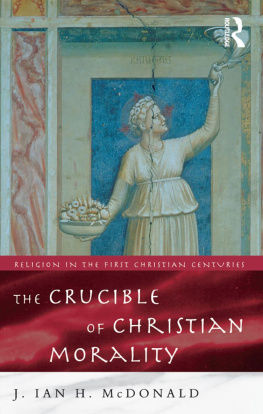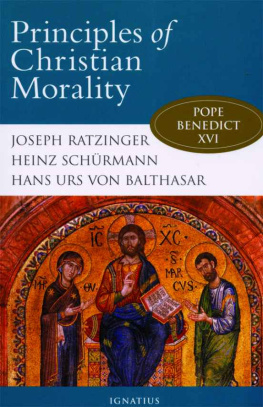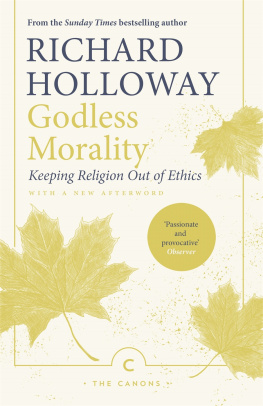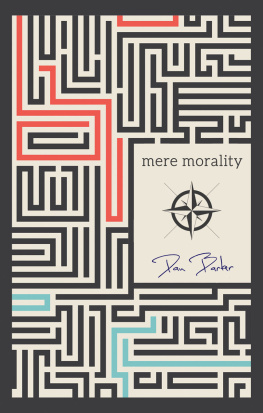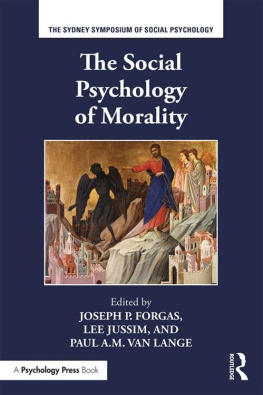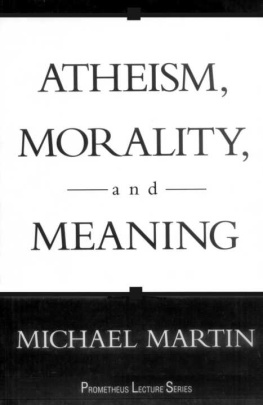ABOUT THE AUTHOR
Professor Keith Ward is a Fellow of the British Academy, and Professorial Research Fellow at Heythrop College, London. He was formerly Regius Professor of Divinity at the University of Oxford, and is one of Britains foremost writers on comparative theology and Christian issues. Notable works written by Keith Ward and published by Oneworld include Christianity: A Beginners Guide, God, Chance & Necessity, God: A Guide for the Perplexed, and God, Faith, and the New Millennium.
Morality, Autonomy, and God
Keith Ward
A Oneworld Book
First published by Oneworld Publications 2013
Copyright Keith Ward 2013
The moral right of Keith Ward to be identified as the Author of this work has been asserted by him in accordance with the Copyright, Designs, and Patents Act 1988
All rights reserved Copyright under Berne Convention A CIP record for this title is available from the British Library
ISBN 978-1-78074-317-2
ISBN 978-1-78074-318-9 (eBook)
A version of Chapter 8 was given as a paper to the Oxford University McDonald Centre for Theology, Ethics and Public Life Conference in May, 2013.
A version of Chapter 14 was given as a paper to the International Conference on Persons at Lund University in August, 2013.
Typeset by Cenveo Publishing Services, India
Oneworld Publications
10 Bloomsbury Street
London WC1B 3SR
England
Stay up to date with the latest books, special offers and exclusive content from Oneworld with our monthly newsletter
Sign up on our website
www.oneworld-publications.com
This book was written during my tenure of a Professorial Research Fellowship at Heythrop College, London, and the research for it was largely undertaken in Heythrop College library. I am very grateful to my colleagues there for their friendship and academic stimulation.
CONTENTS
This book aims to lay out a philosophical defence of a theistic basis for morality. The argument proceeds in four main stages: first, it is argued that views of morality have metaphysical presuppositions; second, that one convincing metaphysical view is that of enriched or expansive naturalism, rooting moral beliefs in the existence of objectively existing values, which are parts of the fabric of reality; third, that a Platonic account of objective value is a coherent form of such an enriched naturalism, and the best way of avoiding ontological queerness, as Mackie calls it; and fourth, that theism is not an optional supernaturalist addition to moral belief, but a metaphysical revision of Platonism, underpinning an objective, authoritative, and efficacious view of morality.
A SUMMARY OF THE ARGUMENT
: Being a Moral Agent
Humans are free agents who (partly) self-determine their acts by reason. This chapter introduces some main themes of the book. It outlines two views of the autonomy of moral discourse: that moral discourse contains an irreducible and distinctively moral element, not reducible to natural or metaphysical facts; and that moral discourse does not depend upon any metaphysical beliefs. I accept the first view, and reject the second, and the whole book can be seen as an argument for the importance of metaphysical beliefs to understandings of morality.
Then I outline a view of the autonomy of moral agents, as the view that moral agents are self-determining, in at least partly determining their own behaviour by moral reasons, which are thereby seen as having causal power. This is contrasted with reductively naturalist accounts of moral belief, like that of E.O. Wilson.
Referring to work by Peter Strawson and Iris Murdoch, I argue that, when forming basic beliefs about human morality and human nature, description, interpretation, evaluation, and commitment are inextricably intertwined. Morality is as much a matter of ways of seeing as of prescription. Any adequate account of moral commitment presupposes seeing humans as agents self-determined by reasons.
: Reason and Sentiment: A Phantom Battle?
Moral reasons essentially relate to human inclinations and desires. The chapter explores the nature of moral reasons, referring to Samuel Clarke and David Hume as finding moral reasons in a realm of eternal and necessary moral truths, or as founded on contingent human sentiments, respectively. It is suggested that morality is primarily about discovering reasonable choices for partly rational, passionate, social, and free agents, and that Clarke and Hume agree at least on this.
: Hypothetical and Categorical
Morality Moral reasons aim at worthwhile states, which constitute human flourishing or well-being. A worthwhile state (a good or value) is a state reasonably choosable by an affective intelligent agent. Using a presuppositional argument developed from Philippa Foot, I argue that there are basic states that all rational agents have a good reason to want. Four such states are understanding, appreciation, creativity, and empathy, and together they can be taken to define important constituents of human flourishing.
: Naturalism and its Discontents
Basic values are objective, parts of the fabric of reality, not simply inferences from the existence of actual desires in individuals. By reference to the enriched naturalism of John McDowell, and the expansive naturalism of James Griffin, I argue that values are not subjective they do not depend upon desires people happen to have. They are matters of perceiving what is the case, and legislate what desires people ought to have.
: Natural Law
The appeal to reason, human inclinations, human flourishing, and the objectivity of values is characteristic of traditional Christian natural law ethics. This raises the question of how far such a morality requires metaphysical foundations. I argue that even an expansively naturalist view of morality has difficulty in upholding the universality and categorical force of an ethic of human flourishing. Aristotelian views of a moral teleology may need revising, but there may be some need for a metaphysical underpinning for beliefs about human flourishing. Discussions of Alasdair MacIntyre and Simon Blackburn ground an argument for a deeper metaphysical foundation to underwrite the objectivity and authority even of an apparently naturalistic ethics.
: The Objectivity of the Good
The idea of a supreme moral ideal (the Good) can provide a home for the objectivity of moral truths and the authority of moral obligations. G.E. Moore, Iris Murdoch, and Stewart Sutherland have spoken of non-natural properties, of the Good, and of the Eternal, as founded on a quasi-Platonic supreme ideal, which can be a motivating object of moral contemplation. As in Plato, there is unclarity about whether or how far causality and purpose, or even real existence, may be involved in positing such an ideal. Nevertheless, Platonic enchantment engenders the idea of an objective focus for moral vision and commitment, which alleviates John Mackies fear of ontological queerness.
: Towards Theistic Morality
The addition of Mind to the Good provides a principle for selecting actual goods (that is, for creating a cosmos), an existent focus of devotion, reverence, and imitation, and a hope for the future triumph of good, that a purely conceptual Ideal cannot. This could be called God. Platonism can generate (as in Augustine, for instance) a theistic base for morality that dissolves the Euthyphro dilemma, and provides a firm metaphysical foundation for moral objectivity and authority.

